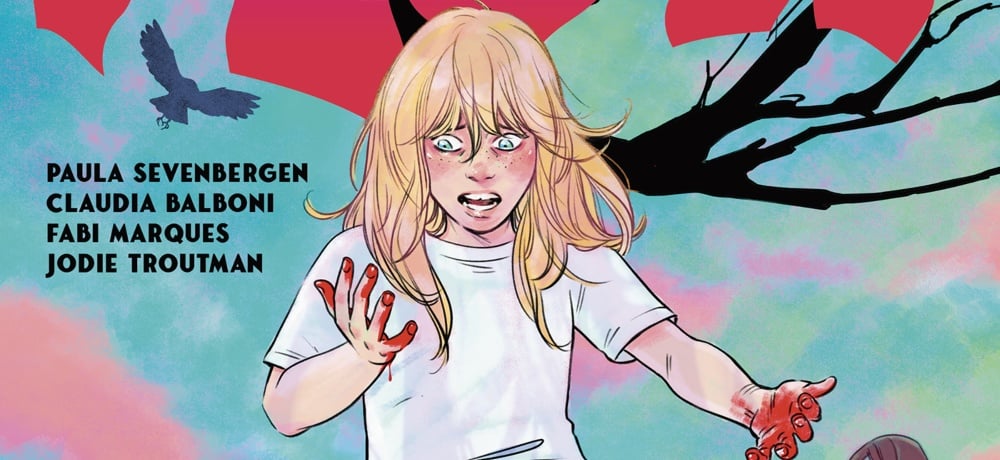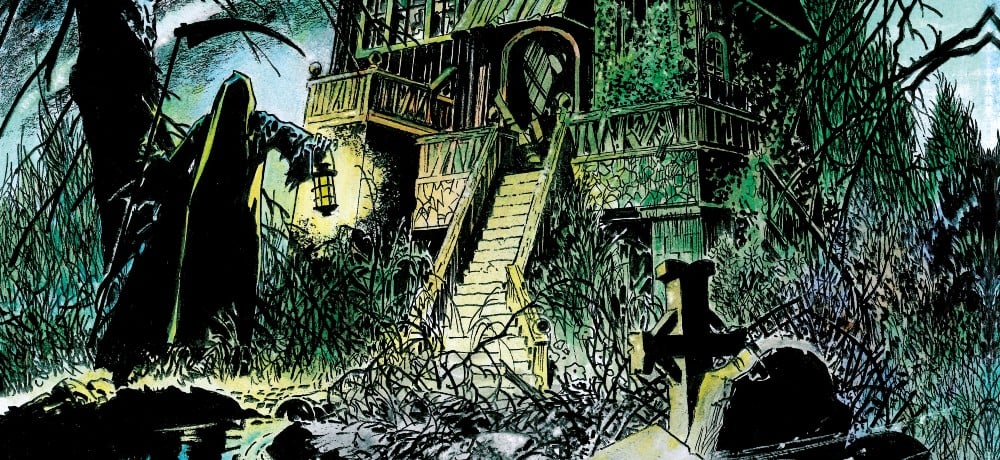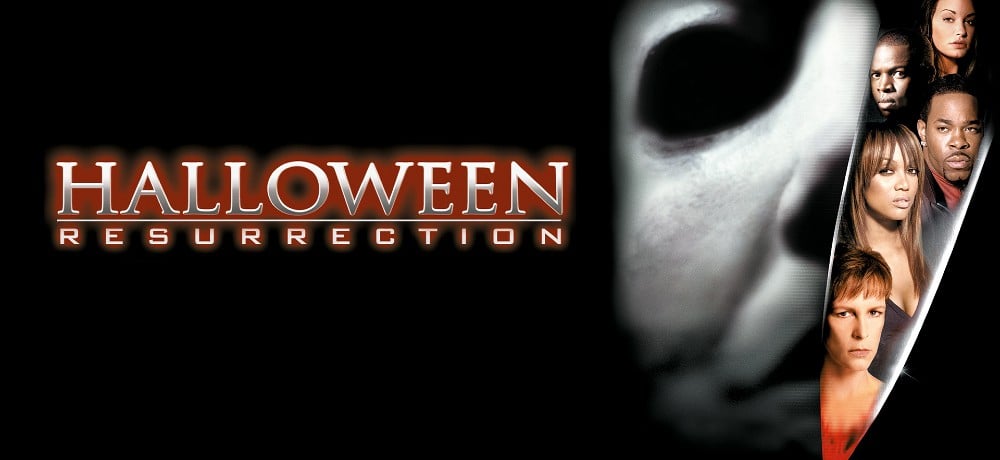






Every film franchise has its odd one out. You know, the one that makes a lot of fans wince or see red at the mere mention of it. For the Friday the 13th series, it’s probably Jason Goes to Hell: The Final Friday. For the Candyman series, it’s very likely to be Candyman 3: Day of the Dead. And for the Halloween series, it’s most definitely Halloween: Resurrection.
I’ve seen countless Halloween fans often rank the 2002 slasher as the worst of the series, and this contempt certainly shows in its Internet Movie Database user rating. Today, it holds a 4.0 out of 10, the lowest of the entire series. Even Halloween co-creator John Carpenter, who avoided watching many of the sequels he wasn’t involved in, took the time to throw shade on the film.
“I watched the one in that house, with all the cameras,” Carpenter told TooFab in 2018. “Oh my god. Oh lord, god. And then the guy gives the speech at the end about violence. What the hell? Oh my lord. I couldn’t believe.”
This year—COVID willing—audiences are set to see the release of Halloween Ends, the third chapter of director David Gordon Green’s trilogy that has wiped away the existence of franchise sequels released between 1981 and 2002, as well as the Rob Zombie remake and its sequel. But July 12, 2022 also marks the 20th anniversary of Resurrection, which brought Rick Rosenthal—the director of Halloween II (1981)—back to the world of slasher Michael Myers (played here by Brad Loree).
It also brought a temporary end to the story of survivor Laurie Strode (Jamie Lee Curtis), until Green and his co-screenwriters Danny McBride and Jeff Fradley brought her back to life with 2018’s Halloween. Looking back on Resurrection two decades after its release, does it deserve its negative reputation? Well, I have to say… yes. Yes, it does, considering some of the choices made during its running time.
The main thing that gives Resurrection such a sting is the way it deals with Laurie Strode in its first 15 minutes. [Spoiler Warning] Not only does it give us the displeasure of seeing her killed, but it also undermines the utterly badass ending of Halloween H20: 20 Years Later, which saw her decapitate Michael—the murderous boogeyman brother who mentally scarred her for life and forced her into hiding—with an axe.
Using the kind of bait and switch you would see in a soap opera or professional wrestling, Resurrection tells us that Laurie didn’t in fact kill Michael, but instead murdered an innocent paramedic with whom he switched places. Because Michael put his mask on the paramedic and crushed his larynx, the innocent man was unable to communicate and was ultimately doomed.
Guilt-ridden, we find Laurie in a mental hospital at the start of Halloween: Resurrection, faking catatonia and waiting for Michael, who comes to kill her. Laurie sets a trap for Michael, which works, but he gets the upper hand when she pauses to make sure it’s him under the mask (which is pretty ridiculous—I mean, who else would be coming after her with a knife?). Rosenthal tries to give Curtis’ death scene some gravitas, but it doesn’t feel like a natural progression of the story, and more just like a rushed way of writing Curtis out of the franchise. Which was, in fact, very much the case.
According to Curtis herself, she learned in pre-production of H20 that a contractual clause didn’t allow them to kill Michael off permanently. After co-executive producer Kevin Williamson suggested they would make the audience only think that Michael was dead in H20, she herself came up with Resurrection’s opening that gave her a clean exit. Still, in the end, it comes off as a cheat and you’re left feeling that Laurie, Curtis, and even the audience deserved a lot better.
After that, if you’re a forgiving viewer who is willing to overlook a movie’s limitations, I don’t think what follows is any worse than some of the other maligned Halloween sequels. In fact, I enjoy Halloween: Resurrection as a junky, guilty pleasure movie along the lines of Friday the 13th: A New Beginning or Texas Chainsaw Massacre: The Next Generation.
The premise isn’t even that bad: Michael returns to his childhood home in Haddonfield, where he finds contestants of an Internet reality show called Dangertainment exploring it in search of the secrets that led to his violence. Of course, the show is a sham, loaded with fake props planted by its creators, played by Tyra Banks and Busta Rhymes (more about him in a minute). But when Michael shows up, real mayhem happens, making the viewing audience of Dangertainment unsure whether what they’re watching is actually real or staged.
Resurrection features many of the traditional elements we’d expect in cheesy slashers, as well as a found footage element that feels like it was trying to cash in on the success of The Blair Witch Project or even the MTV show Fear. Thankfully, Rosenthal doesn’t let the movie become a blur of shaky camerawork and it has its share of enjoyable sequences.
The cast is pretty fun, too, particularly Battlestar Galactica’s own Katee Sackhoff, who is a lively joy whenever she’s on screen, as well as Sean Patrick Thomas, who gets saddled with a character who believes Michael’s tendencies are due to his diet. (Weirdly, Thomas is billed as having a “special appearance” in the film, even though he’s still in it beyond the hour mark).
There is also the matter of Busta Rhymes. A lot of people like to rip on the rapper/actor’s performance in this movie, as he moves through scene after scene with a grin on his face, a larger-than-life presence, and one-liners (“Trick or treat, motherfucker!”). In one scene, he even trash talks Michael to his face, mistaking him for an actor.
In another scene, Busta fights Michael with kung fu and shoves a live wire into his crotch (not even Dr. Loomis could boast such an achievement). You either find his interactions with Michael embarrassing or hilarious, and I have to say, I’m in the latter camp. I also like that the film—a mainstream, studio-funded slasher in the early 2000s—has a Black actor as one of its main protagonists and he lives to see the end. It was pretty rare then and still is, unfortunately.
In closing, I don’t think Resurrection is a classic, but it is pretty dumb fun if you can forgive its flaws. If you hated it in 2002 but are willing to be more forgiving, now may be the time to give it another look. But if you can’t get over the insulting way it dispatches Laurie, that’s completely understandable. Let’s all just hope that Green, Carpenter, and Curtis bring Laurie’s story to a more satisfying close this October.